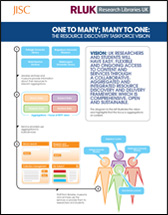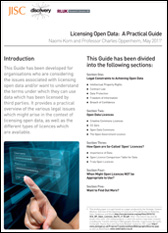Opening Up Data
Tacking the complexity of licensing issues
Institutions and service providers who want to make their resources more discoverable require clarity in the licensing arrangements for aggregated data, particularly around re-use. The work of the Open Bibliographic Data (OBD) Guide project established use cases for making data open in the library sector, and helped to clarify the legal ramifications of participating in 'Open'. Using the impetus created by the OBD Guide, Discovery has been working across the sectors to identify gaps in community understanding, legal process and technical readiness. With this in mind we commissioned Naomi Korn and Professor Charles Oppenheim to produce ‘Licensing Open Data: A Practical Guide’ which was published in 2011.
This was followed in May 2012 with a Discovery Licensing Clinic led by Naomi Korn which was attended by representatives from across the libraries, archives and museums sector. Attendees were able to benefit from the practical advice and guidance on offer from the assembled experts. The aim of the Clinic was to offer attendees the opportunity to develop practical approaches to the Discovery Open Metadata Principles. During Autumn 2012 we are running further Clinics in response to popular demand from the community.
Advocating open data
Discovery has also addressed the need for advocacy, support and community engagement so that the benefits of open metadata are identified and communicated to support decision making within institutions.
Our work to define and publicise the Discovery Open Metadata Principles has been fundamental to this principle.
In 2011 we collaborated with DevCSI to engage the technical community via an open data developer competition. The shortlisted competition entries effectively showcased eight concrete use cases for open metadata.
Two large-scale exemplar projects have been funded by JISC to demonstrate the potential for content aggregation around a single research topic, made possible through open metadata. A further 22 projects have been funded in two phases and our hope is that the cumulative outputs of these projects will contribute considerably towards demonstrating what is possible and also contributing new sources of open metadata and developer tools that the community can exploit as a starting point for their own open metadata initiatives.
A key aspect of our advocacy involves working with the community to identify how a business case for openly publishing collections metadata might be made, and also providing corroborating evidence and institutional perspectives through case studies and interviews .


